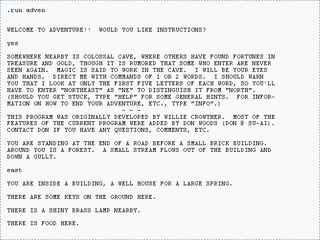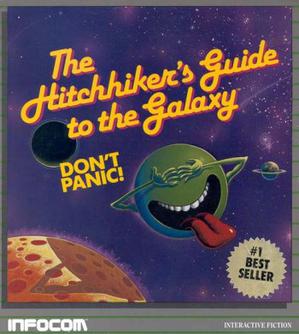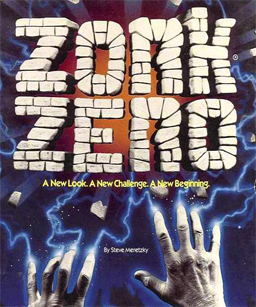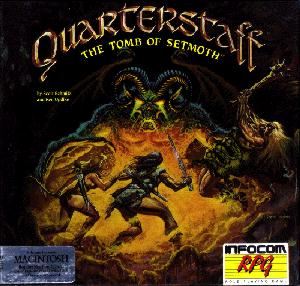Infocom was an American software company based in Cambridge, Massachusetts, that produced numerous works of interactive fiction. They also produced a business application, a relational database called Cornerstone.

Interactive fiction, often abbreviated IF, is software simulating environments in which players use text commands to control characters and influence the environment. Works in this form can be understood as literary narratives, either in the form of interactive narratives or interactive narrations. These works can also be understood as a form of video game, either in the form of an adventure game or role-playing game. In common usage, the term refers to text adventures, a type of adventure game where the entire interface can be "text-only", however, graphic text adventures still fall under the text adventure category if the main way to interact with the game is by typing text. Some users of the term distinguish between interactive fiction, known as "Puzzle-free", that focuses on narrative, and "text adventures" that focus on puzzles.

Zork is a text-based adventure game first released in 1977 by developers Tim Anderson, Marc Blank, Bruce Daniels, and Dave Lebling for the PDP-10 mainframe computer. The original developers and others, as the company Infocom, expanded and split the game into three titles—Zork I: The Great Underground Empire, Zork II: The Wizard of Frobozz, and Zork III: The Dungeon Master—which were released commercially for a range of personal computers beginning in 1980. In Zork, the player explores the abandoned Great Underground Empire in search of treasure. The player moves between the game's hundreds of locations and interacts with objects by typing commands in natural language that the game interprets. The program acts as a narrator, describing the player's location and the results of the player's commands. It has been described as the most famous piece of interactive fiction.

Steven Eric Meretzky is an American video game developer. He is best known for creating Infocom games in the early 1980s, including collaborating with author Douglas Adams on the interactive fiction version of The Hitchhiker's Guide to the Galaxy, one of the first games to be certified "platinum" by the Software Publishers Association. Later, he created the Spellcasting trilogy, the flagship adventure series of Legend Entertainment. He has been involved in almost every aspect of game development, from design to production to quality assurance and box design.

The Hitchhiker's Guide to the Galaxy is an interactive fiction video game based on the comedic science fiction series of the same name. It was designed by series creator Douglas Adams and Infocom's Steve Meretzky, and it was first released in 1984 for the Apple II, Macintosh, Commodore 64, CP/M, MS-DOS, Amiga, Atari 8-bit family, and Atari ST. It is Infocom's fourteenth game.
Legend Entertainment Company was an American developer and publisher of computer games, best known for creating adventure titles throughout the 1990s. The company was founded by Bob Bates and Mike Verdu, both veterans of the interactive fiction studio Infocom that shut down in 1989. Legend's first two games, Spellcasting 101: Sorcerers Get All the Girls and Timequest, had strong sales that sustained the company. Legend also profited from negotiating licenses to popular book series, allowing them to create notable game adaptations such as Companions of Xanth and Gateway. Legend also earned a reputation for comedic adventures, with numerous awards for Eric the Unready in 1993. As the technology of the game industry changed, Legend continued to expand its game engine to take advantage of higher graphical fidelity, mouse support, and the increased media storage of the compact disc.

A Mind Forever Voyaging (AMFV) is a 1985 interactive fiction game designed and implemented by Steve Meretzky and published by Infocom. The game was intended as a polemical critique of Ronald Reagan's politics.

Leather Goddesses of Phobos is an interactive fiction video game written by Steve Meretzky and published by Infocom in 1986. It was released for the Amiga, Amstrad CPC, Amstrad PCW, Apple II, Macintosh, Atari 8-bit family, Atari ST, Commodore 64, TI-99/4A and MS-DOS. The game was Infocom's first "sex farce", including selectable gender and "naughtiness"—the latter ranging from "tame" to "lewd". It was one of five top-selling Infocom titles to be re-released in Solid Gold versions. It was Infocom's twenty-first game.

Planetfall is a science fiction themed interactive fiction computer game written by Steve Meretzky, and the eighth title published by Infocom in 1983. The original release included versions for Apple II, Atari 8-bit family, TRS-80, and IBM PC compatibles. The Atari ST and Commodore 64 versions were released in 1985. A version for CP/M was also released. Although Planetfall was Meretzky's first title, it proved one of his most popular works and a best-seller for Infocom; it was one of five top-selling titles to be re-released in Solid Gold versions including in-game hints. Planetfall uses the Z-machine originally developed for the Zork franchise and was added as a bonus to the "Zork Anthology".

The Lost Treasures of Infocom is a 1991 compilation of 20 previously-released interactive fiction games developed by Infocom. It was published by Activision for MS-DOS, Macintosh, Amiga, and Apple IIGS versions. It was later re-released on CD-ROM, and in 2012 on iOS.

Zork Zero: The Revenge of Megaboz is an interactive fiction computer game, written by Steve Meretzky over nearly 18 months and published by Infocom in 1988. Although it is the ninth and last Zork game released by Infocom before the company's closure, Zork Zero takes place before the previous eight games. Unlike its predecessors, Zork Zero is a vast game, featuring a graphical interface with scene-based colors and borders, an interactive map, menus, an in-game hints system, an interactive Encyclopedia Frobozzica, and playable graphical mini-games. The graphics were created by computer artist James Shook. It is Infocom's thirty-second game.

Stationfall is an interactive fiction video game written by Steve Meretzky and released by Infocom in 1987. It was released for the Commodore 64, Amiga, Amstrad CPC, Apple II, Atari 8-bit family, Atari ST, and MS-DOS,. The game is a sequel to Planetfall, one of Infocom's most popular titles. It is Infocom's twenty-fifth game.

Journey: The Quest Begins is an interactive fiction computer game designed by Marc Blank, with illustrations by Donald Langosy, and released by Infocom in 1989. Like the majority of Infocom's works, it was released simultaneously for several popular computer platforms, such as the Commodore 64, Apple II, and PC. Journey is unusual among Infocom games in that it could be played entirely via mouse or joystick, with no typing required. It was the thirty-fifth and last game released by Infocom before parent company Activision closed the Cambridge office, effectively reducing Infocom to a "label" to be applied to later games.

Labyrinth: The Computer Game is a 1986 graphic adventure game developed by Lucasfilm Games and published by Activision. Based on the fantasy film Labyrinth, it tasks the player with navigating a maze while solving puzzles and evading dangers. The player's goal is to find and defeat the main antagonist, Jareth, within 13 real-time hours. Unlike other adventure games of the period, Labyrinth does not feature a command-line interface. Instead, the player uses two scrolling "word wheel" menus on the screen to construct basic sentences.

Robert Bates is an American computer game designer. One of the early designers of interactive fiction games, he was co-founder of Challenge, Inc., which created games in the 1980s for the pioneering company Infocom. After Infocom's dissolution in 1989, Bates co-founded Legend Entertainment to continue publishing games in the Infocom tradition, but with added graphics. Notable games that he has designed, written, or produced include Unreal II (2003), Spider-Man 3 (2007), and Eric the Unready (1993), listed as Adventure Game of the Year by Computer Gaming World magazine and also included on the 1996 list of "150 best games of all time". In 1998 he wrote the award-winning game Quandaries for the U.S. Department of Justice. He has twice been the chairperson of the International Game Developers Association, which honored him with a Lifetime Achievement Award in 2010. Bates has written extensively about game design and development in works such as the 2001 book Game Design: The Art and Business of Creating Games, which is commonly used as a game design textbook in college courses. From 2011–2014, Bates was Chief Creative Officer for External Studios at Zynga. He continues to work as an independent consultant with various publishers in the games industry.

The Space Bar is a 1997 graphic adventure game developed by Boffo Games and published by Rocket Science Games and SegaSoft. A comic science fiction story, it follows detective Alias Node as he searches for a shapeshifting killer inside The Thirsty Tentacle, a fantastical bar on the planet Armpit VI. The player assumes the role of Alias and uses his Empathy Telepathy power to live out the memories of eight of the bar's patrons, including an immobile plant, an insect with compound eyes and a blind alien who navigates by sound. Gameplay is nonlinear and under a time limit: the player may solve puzzles and gather clues in any order, but must win before the killer escapes the bar.
Classic Text Adventure Masterpieces of Infocom is a collection of 33 computer games from interactive fiction pioneer Infocom, and the top 6 winners of the 1995 Interactive Fiction Competition, released in 1996. All 39 games are combined on a single cross-platform CD-ROM, which also includes PDFs of all the Infocom games' instructions, maps, and hint booklets.

Space Quest IV: Roger Wilco and the Time Rippers is a 1991 graphic adventure game by Sierra On-Line. It was released on floppy disks on March 4, 1991, and released on CD-ROM in December 1992 with full speech support and featuring Laugh-In announcer Gary Owens as the voice of the narrator. It featured 256-color hand painted graphics and a fully mouse-driven interface. It was one of the first video games to use motion capture animation. It cost over US$1,000,000 to produce and sold more than its three predecessors combined. An Atari ST version was announced via Sierra Online's magazine, Sierra News Magazine, but was later canceled.

Quarterstaff: The Tomb of Setmoth is an interactive fiction role-playing video game developed by Scott Schmitz and Ken Updike and released by Infocom for Macintosh in 1988. The game features a text parser, graphics, a dynamically updated map, and a graphical interface that incorporates Mac OS hierarchical menus.

Spellcasting 101: Sorcerers Get All the Girls is a 1990 adventure game. It was the first installment of the Spellcasting series created by Steve Meretzky during his time at Legend Entertainment. All three games in the series tell the story of young Ernie Eaglebeak, a student at the prestigious Sorcerer University, as he progresses through his studies, learning the arcanes of magic, taking part in student life, and meeting beautiful women.

















